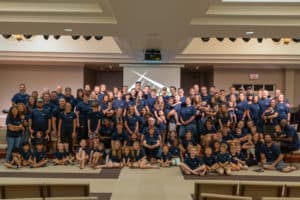Leveraging Your Church to Reach Service Members Living in the Barracks
By: John Tolleson
The military barracks is essentially a college dormitory where everybody gets a paycheck. It’s a bunch of stressed-out, hormone-filled, athletic people living in studio apartments in a giant building. Only in the barracks have I seen men in their thirties get hammered with junior enlisted folks while drawing precision shooting formulas on the wall. Only in the barracks have I been awakened at 2 A.M. to brawl with drunken friends who wanted to body slam each other (and me once) on the sidewalk. I used to come home from one of Pillar Jacksonville’s small groups to witness my co-workers choking each other out on the grass, which always made me feel welcome.
Though it might look different for others, whether better or worse, the barracks to me felt like a temple to sex, fitness, and death. Looking back, it feels appropriate to use Charles Dickens’s amazing words: “It was the best of times; it was the worst of times.” There’s so much that I learned and benefitted from living in the barracks. But there were also deeply horrible things that threatened my soul for years afterward.
Every church in the Praetorian Project lives between two cities. There’s the city that we name our churches after (Pillar church of ____). And then there’s the dark, highly populated, mostly forgotten city of the barracks, where thousands of souls languish in hedonistic debauchery. It is this second city that requires special Gospel attention. It feels unreachable to pastors. It feels horrible to young Christians living there. But it’s where Jesus wants his Gospel to go. So, here are 4 thoughts for pastors and churches that want to reach into the barracks.
- Find the Christians.
It sometimes feels like the barracks are completely unreached. Fewer and fewer junior enlisted military members are a part of churches. You might only have one or two in your church that live in the barracks. But it’s so important to recognize that this is a wondrous thing! There’s so much growth and potential to be had with even one person who lives in the barracks and knows Jesus. The Gospel is alive in the barracks! Rejoice in that and take full advantage of it. Take these barracks living church members and…
- Pour God’s word into them.
Read God’s word with them. Biblical discipleship, biblical exposition, and time that soaks in God’s word is the most important thing to do with these folks who are God’s light in a dark place. Charge them up weekly and send them back to shine Christ.
- Let them into your house.
Young military members are weird. Sometimes it may feel a bit burdensome. It may feel awkward. But they need to see your family dynamic, marriage, and home life. If you offer them food they’ll come. Disciple them and then…
- Send them to their mission field.
Never treat the barracks like it’s not where God wants them to be. Help these Christians see their current home as a mission field that God has placed them in to evangelize, make disciples, and shine Christ.
Final Thoughts
There is a bridge that spans the gap between the two cities that we plant our churches in. This bridge is the men and women (often under the age of twenty-two) who love Jesus and attend our churches and live in the barracks. They need our help, and by God’s grace, they’ll flame with Gospel light in our churches, in their barracks, and across the world.


